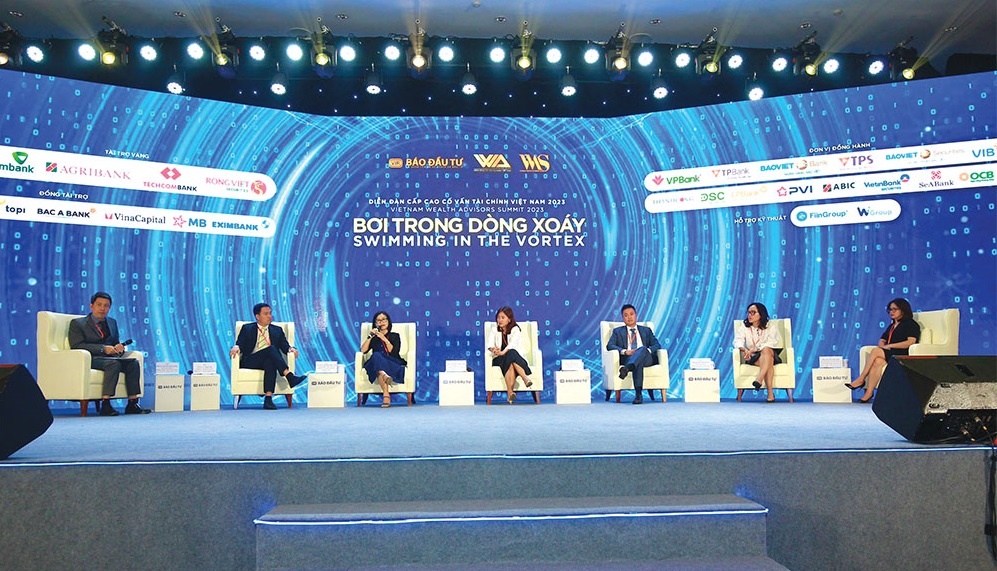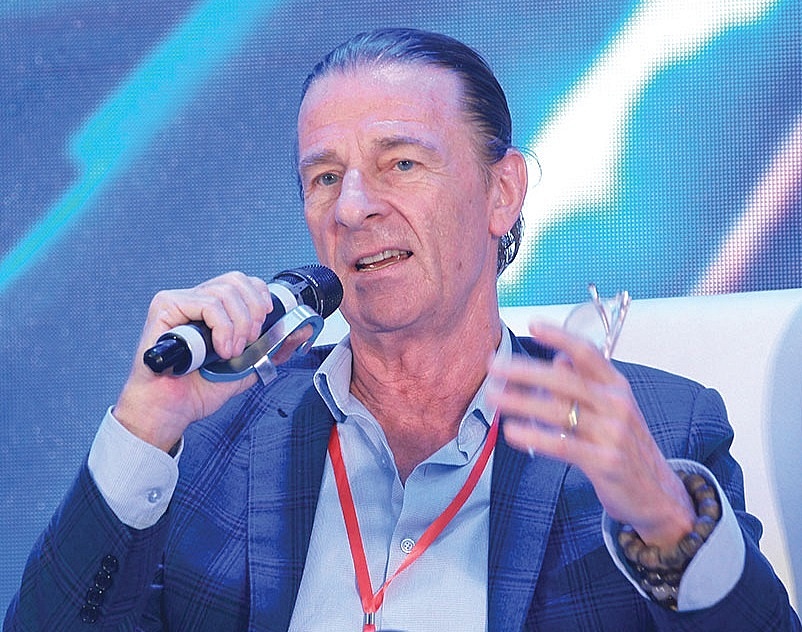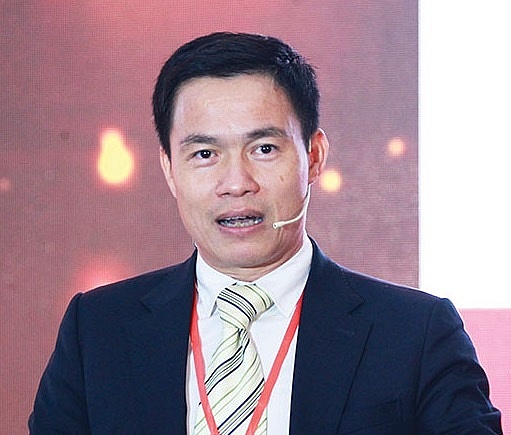Trends set to dictate a robust economy
During last week’s Vietnam Wealth Advisor Summit 2023 in Hanoi, experts assessed that Vietnam is not immune to the intensifying global competitive environment.
 |
| Experts pored over the growth projections for Vietnam |
Experts agreed that the Fourth Industrial Revolution, characterised by technological advancements, robotics, and automation, has brought about significant transformations in global economic activities. Vietnam, too, is experiencing the effects of these changes.
Nguyen Anh Duong, head of the General Research Department at the Central Institute for Economic Management (CIEM), provided insights into how rapid technological progress has profoundly impacted the global economic recovery and growth.
“Research across ASEAN and East Asia consistently revealed that automation and the strategic utilisation of technology, particularly AI, can effectively facilitate the reconfiguration of production processes and the redistribution of the workforce across economies,” Duong said. “Simultaneously, it spurs trade and service activities grounded in technology.”
Providing an example, in 2021, the CIEM initiated a collaborative agreement with Thailand to enable retailers to employ QR codes for payments. As a result, Vietnamese consumers visiting Thailand can now transact in VND at over eight million payment points accepting QR codes.
Delving into the adverse repercussions of the global technological transition, Nguyen Ba Hung, principal country economist at the Asian Development Bank in Vietnam noted that, given the ongoing competition with China, the United States and numerous European nations are striving for greater self-sufficiency in the electronic production chain.
“Consequently, they have extended subsidies to corporations to establish chip manufacturing facilities within their own territories. The intention of nations to repatriate a substantial portion of the production chain will inevitably affect Vietnam and other countries engaged in the global electronic production network,” Hung said.
On the bright side, experts also shared notable indications regarding the robustness of Vietnam’s economy.
Duong, in reference to the CIEM’s Vietnam Economic Report for the first half of this year, outlined a projection of global economic growth at 3 per cent for the entirety of 2023. This projection notably exceeded the forecasts of several other organisations, which predominantly ranged between 2.1 per cent and 2.8 per cent.
“Many experts initially regarded the 3 per cent growth projection as somewhat implausible. However, the International Monetary Fund (IMF) also unveiled a parallel global economic growth forecast of 3 per cent on July 25,” he said.
Elevated by the favourable global economic growth outlook, the CIEM has formulated three distinct scenarios for Vietnam’s macroeconomics in 2023, envisaging potential GDP growth rates of 5.34, 5.72, and 6.46 per cent.
“We engaged in discussions with the IMF and highlighted the coexistence of perils and prospects within the current economic landscape. Those who adeptly seize opportunities stand to benefit,” Duong emphasised.
Evaluating Vietnam’s international connectivity, Le Xuan Nghia, a banking and financial expert, asserted that due to its pronounced openness to the global arena, Vietnam is primed for a potentially swifter recovery compared to certain counterparts. This is attributable to the nation’s substantial reliance on foreign direct investment, which constitutes one-quarter of GDP and contributes to 70 per cent of industrial output, surpassing the global average.
“In a recent study focusing on the worldwide Purchasing Management Index (PMI), we observed a marginal recovery in nearly all countries, indicating a slight increase of one point. This trend extends to Northeast Asia, yet notably, Vietnam experienced an approximate surge of 2.5 points,” Nghia said.
“Our projections suggest that, commencing from the fourth quarter of 2023, Vietnam’s PMI may further improve. Consequently, a moderate economic recovery is envisaged from the concluding quarter of this year to the initial half of the subsequent year.”
Phan Duc Hieu, standing member of the National Assembly Economic Committee, underscored two prevailing trends: the escalating competition and the burgeoning concept of green consumption.
“In the backdrop of a challenging global economic scenario, we are witnessing a surge in competition, not only among enterprises but also export nations. Consequently, even amidst favourable shifts in the global economic landscape, it is imperative to recognise that Vietnamese enterprises cannot inherently reap benefits from these trends,” Hieu said.
Concurrently, the paradigm of green consumption stands as an irreversible trajectory.
“Enterprises that fail to embrace a strategy of ecological transformation aligned with this trend will inevitably lose their competitive edges and a consequent loss of market share,” Hieu said.
Given this context, he assessed that domestic reforms, particularly those related to institutional restructuring, assume heightened significance both in the immediate and long-term perspectives. Nevertheless, certain businesses remain concerned about legal obstacles, underscoring the substantial need for reform and its potential impact.
Dr. Nguyen Dinh Cung, former director of the CIEM, noted that internal reform stands as the pivotal determinant for propelling economic growth and fostering job creation.
“In line with both international precedents and local practices, instances of adversity often serve as potent catalysts for transformative change,” he said.
However, Cung highlighted that despite the multifaceted directives issued by the prime minister and the government, substantive reforms and internal shifts have yet to manifest sufficiently to counterbalance external challenges. He emphasised the necessity of prioritising fiscal policies over monetary ones and, aside from business environment reform, advocated for a resolute enforcement of the VAT refund policy for enterprises accompanied by an extension of the VAT reduction policy, thereby presenting a dual-pronged approach to foster economic vitality.
| Dominic Scriven - Chairman, Dragon Capital
Divergent forecasts from reputable institutions such as the World Bank and Fitch Ratings underscore the complexities inherent in deciphering the multifaceted forces influencing macroeconomic variables. For those who entered the stock market in 2022, it was indeed a challenging year. The corporate bond market, especially towards the end of the preceding year, presented considerable difficulties. Despite increasing interest rates, the US Federal Reserve has consistently employed an incremental approach. This approach has translated into favourable signals for financial markets, evident in the commendable performance of global stock markets, including Vietnam, which have surged by 15-28 per cent. Vietnam has maintained stable and well-regulated inflation rates in the preceding as well as the ongoing year. The collaborative initiatives undertaken by the State Bank of Vietnam and the Ministry of Finance to cultivate a favourable financial environment have contributed to partial recovery from the losses endured in the preceding year. However, the prospects of a “very robust” recovery anticipated by the World Bank and some recent analysts for the forthcoming year seem somewhat overly optimistic, as seen by the challenges facing key global economic drivers such as the United States, China, Europe, Japan, and Africa. In this context, the advisory role exercised by investment institutions, catering to clients, and the broader investor community are pivotal, considering the importance of vigilantly assessing risks when making financial investments. Trinh Quynh Giao - CEO, PVI Asset Management
Economic trends tend to operate in cycles, with recessions and growth phases having historically repeated themselves. My team doesn’t merely gauge success through monthly or annual growth percentages. Success for us is about deep, strategic financial planning. This approach isn’t solely for corporations; individuals should focus on a similar approach. Every significant life decision, whether it’s purchasing a home or planning a child’s overseas education, needs its financial blueprint. Tailored financial strategies are of utmost importance and different phases demand specific profit goals. An insurance enterprise, for instance, requires high liquidity levels. A pivotal aspect of financial health is prudent debt asset management. For an individual, it starts with understanding the present debt and forthcoming expenses. Only after addressing these obligations should one delve into investments and profits. This delineation aids in optimally structuring assets and guiding financial futures. During bond crises when saving interest rates rocketed, astute investors found silver linings. When interest rates peaked at 12 per cent, we recalibrated, pushing our deposits to 70 per cent, a sharp increase from the usual 50 per cent. In my perspective, 70 per cent of investment profits stem from the strategic reshuffling of one’s asset portfolio. The remaining 30 per cent is about the technicalities and choosing the right stock or sector. Monitoring macroeconomic dynamics is crucial to allocating assets wisely. Dau Thi Kim Nhung - Retail marketing director Vietcombank
The segment of priority customers or high-end customers in the Vietnam market is forecasted to have annual average growth at 10-12 per cent from now to 2030. It is expected that Vietnam will have more than 10 million people in this segment by 2025. At many commercial banks, this group of customers contributes 40 per cent of the banks’ income despite accounting for less than 1 per cent in number. Therefore, banks are well aware of the role and importance of priority customers, even some large banks have identified this segment as a growth engine, and now have devoted power forces to invest comprehensively in this segment. Vietcombank is one of the pioneer banks in implementing this service, which debuted for the first time in 2019 with the Vietcombank Priority brand. We focus on investing from technology infrastructure, high-quality personnel, and comprehensive services to specialised transaction location and space to match the value generated by our Priority customers. With outstanding financial solutions and valuable experiences, Vietcombank Priority has attracted hundreds of thousands of loyal customers. In addition to focusing on financial transactions, and advising on investment opportunities for customers, Vietcombank Priority is also designed to bring emotional experiences, tailored to each customer’s personal style. We have a dedicated service model, a specialist trading space, and comprehensive product and service packages with attractive interest rate/banking fee incentives. These include the Vietcombank Priority Lounge premium airport lounge, and Vietcombank Visa Signature credit card and many other high-end card lines with features such as unlimited cashback, premium dining, entertainment, education, travel, and insurance for the whole family. Le Duc Khanh - Director of Analysis VPS Securities Company
Amid low interest rates, unattractive deposit yields, and stable foreign exchange rates, equities have become more appealing. Following a dip in investor confidence, the bond market is rebounding, but full recovery is pending. Global stock markets are buoyant, including in Vietnam. Inflows since May have powered growth, drawing billions in sessions. Domestic investor accounts reached 7.5 million by July-end, with 151,000 new accounts in July alone. Challenges persist in H1 corporate profit recovery, yet the stock market responds strongly due to limited investment options. This pattern mirrors the market’s forward-looking nature. Prospects hinge on monetary policy, policy shifts, economic rebound, and valuation trends. The 1,200 VN-Index milestone is within 1,280 to 1,300 points – a resistance zone marked by volatility. Consolidation periods balance market ascent. Strong sectors amid this rise are energy, tech, infrastructure beneficiaries, retail, and utilities. Careful stock selection using valuation metrics is vital for prudent investment. Vigilance, flexibility, and risk management are crucial. Nguyen Thi Phuong Lam - Head of Analysis and Investment Consulting, Viet Dragon Securities Corporation
According to our recent statistics, the growth of listed companies representing the economic sector is much lower compared with the GDP growth of the Vietnamese economy. Most industries show signs of bottoming in the fourth quarter of 2022 and the first quarter of 2023. However, there is a strong division between industries. Some industries post profit growth, outperforming the general picture of the market, such as financial services, industrial parks, and life insurance. These industries recorded a good recovery rate in the first six months of the year. On the contrary, a number of other industries have not seen any clear signs of recovery. Slower-than-expected recovery of these industries is in line with shrinking consumer confidence. When looking at the private equity index among these industry groups, we see a huge divergence, as most are trading at a much higher private equity, surpassing the regular trading range in the last three years and even much higher than the median private equity of these industries. It indicates that investors are paying a high private equity for industry groups because of future earnings growth expectations for these sectors. This is especially true after government agencies offer a variety of policies and support packages for the economy. Pham Thi Thanh - Deputy director of Retail Banking BIDV
Banks are deemed to be providers of basic and traditional products such as credit cards, channels for depositing or lending capital for businesses, or liquidity. However, in terms of providing services to customers with large assets, BIDV will focus on the strategy of providing total asset management services to bring value to customers. Indeed, banks possess unique selling points compared to securities companies or fund management companies. For high-end customers, the bank will support them in accessing bonds, open-end fund certificates, and personal trust portfolio management services. Deep-pocketed customers not only have demand for traditional products but also for investment channels in the securities market, bonds, stocks, and real estate. The bank plays the role of an advisor and consultant, advising customers on the most optimal plan to preserve and increase assets in a sustainable way. |
 | Equities touted as investment must at 2023 Wealth Advisor Summit As the second panel session of the 2023 Vietnam Wealth Advisor Summit wraps up in Hanoi, industry leaders shine a light on the shifting investment landscape. The summit, held on August 8 in Hanoi, witnessed the participation of more than 300 leaders from securities firms and fund management companies. |
What the stars mean:
★ Poor ★ ★ Promising ★★★ Good ★★★★ Very good ★★★★★ Exceptional
Related Contents
Latest News
More News
- Banking sector targets double-digit growth (February 23, 2026 | 09:00)
- Private capital funds as cornerstone of IFC plans (February 20, 2026 | 14:38)
- Priorities for building credibility and momentum within Vietnamese IFCs (February 20, 2026 | 14:29)
- How Hong Kong can bridge critical financial centre gaps (February 20, 2026 | 14:22)
- All global experiences useful for Vietnam’s international financial hub (February 20, 2026 | 14:16)
- Raised ties reaffirm strategic trust (February 20, 2026 | 14:06)
- Sustained growth can translate into income gains (February 19, 2026 | 18:55)
- The vision to maintain a stable monetary policy (February 19, 2026 | 08:50)
- Banking sector faces data governance hurdles in AI transition (February 19, 2026 | 08:00)
- AI leading to shift in banking roles (February 18, 2026 | 19:54)







 Tag:
Tag:




















 Mobile Version
Mobile Version